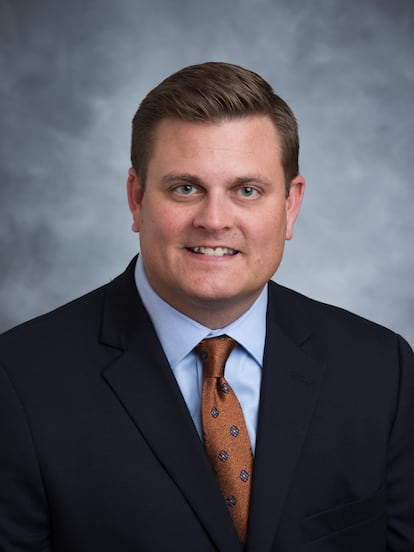UnitedHealthcare CEO’s murder sparks consumer outrage over health insurance abuses
The words engraved on the shell casings of the bullets that ended Brian Thompson’s life conveyed a message of anger at unfair practices that are common in the sector and have long been denounced by regulators and legislators


Nothing justifies murder, but the flood of messages on social media, posted by the victoms of the ruthlessness — or profitability depending on perspective — of insurance companies, suggests that the killing of Brian Thompson, CEO of UnitedHealthcare, has exposed a Pandora’s box of public discontent.
The examples are telling: a letter from the doctor of a child with cancer whose request for antiemetic drugs to ease nausea was denied by the insurance company due to cost concerns. A UnitedHealthcare Facebook post announcing the tragic news received more than 23,000 celebratory emojis before it was removed. Reactions poured in: “Health insurance companies are parasites that siphon money from the sick, dying, and injured,” one user wrote. Another remarked, “I’m just surprised [the murder] didn’t happen sooner.” A third, on X (formerly Twitter), observed: “I don’t think the ruling establishment has grasped the extent of the public’s anger until now, all at once.”
“UnitedHealth CEO’s killing unleashes social media rage against insurers,” read the Thursday headline of Axios, a publication not known for sensationalism. This wave of outrage — which fuels law firms specializing in insurance claims — underscores a broader malaise. According to the NGO Premier, health professionals filed approximately $20 billion in reimbursement requests to insurance companies in 2022 — many of which were rejected, especially for costly treatments exceeding $14,000.

Since the murder, internet users have been vocal in criticizing coverage conditions and other abusive practices, while UnitedHealthcare — the largest private insurer in the country by market share — removed its executive organizational chart and corresponding photos from its website, as did other firms in the sector, conducting a quick risk assessment.
The Minnesota-based company has a dubious record of denying coverage, making it a target of lawsuits and criticism from regulators and legislators, much like other major players in the industry. The method is simple: deny coverage to maximize profits. The most flagrant issue is that coverage is denied even when private clients — who are not beneficiaries of Medicaid or Medicare, the two federal public programs — pay high monthly premiums and additional co-payments for doctor visits. Only 44% of adults rate the quality of U.S. healthcare as excellent or good, the lowest percentage since Gallup began tracking this survey in 2001, according to a poll released on Friday.
Thompson’s wife, Paulette, told NBC News on Wednesday that her husband had been threatened prior to his death. A false bomb threat had been made to their home hours before the murder. Thompson’s killing is far more than just a crime story or a headline for the business section (UnitedHealthcare is the insurance arm of UnitedHealth Group, the fourth most valuable in the country, according to the Fortune 500). It is a bloody reflection of how healthcare operates in the United States — a system so perverse that it has bankrupted thousands of families who couldn’t afford the bills for their medical treatment.
The killer left a message with the bullets: the words “deny, defend, and depose” (the latter also translates as “declare” in a judicial context), seemingly mimicking the motto of insurance companies used to refuse coverage for medical procedures or reimbursements: delay, deny, defend. This was also the title of a book published in 2010 that exposed these practices, which have left many families struggling to cope.
Including people like Margaret Murray, a neighbor at the hostel where Thompson’s killer spent the night in New York. She was watching the police activity outside the establishment on Thursday while authorities searched room 407. Wearing a neck brace, Murray, an African-American woman in her seventies, explained that she had to hire a lawyer because her insurance refused to cover a second operation on her cervical spine, which still left her with stiffness.
“The first surgery was covered by the insurance, but the pain and dizziness didn’t go away, so I had to have another operation. The company refused to reimburse the second surgery, and now I have a $45,000 bill that I can’t pay. It’s tremendously unfair, because the premiums we pay for insurance aren’t cheap — they cost us thousands of dollars a year. That’s why I’ve had to put it in the hands of lawyers, just like many people I know,” she explained.
In the U.S., it is difficult to refer to healthcare users as “patients.” They aren’t users in the sense that those in countries with universal, free healthcare systems are. In the U.S., they are clients, with a credit card that often weighs as much, if not more, than their medical records. Beyond the ongoing criminal investigation and the potential arrest of the suspect — who is still on the run — Thompson’s death has been seen within the healthcare sector as a warning, already leading to some immediate consequences: on Thursday, less than 24 hours after the murder, the insurer Anthem Blue Cross Blue Shield revoked a new policy that had limited coverage of anesthesia during surgical procedures.

The company had set a time limit for paying for anesthesia: if a procedure exceeded the duration that Anthem deemed appropriate, the insurer would not cover the extra time. New York Governor Kathy Hochul announced on X that the controversial measure would be lifted. “We pushed Anthem to reverse course on their decision to strip anesthesia coverage away from New Yorkers and today [Thursday] they will be announcing a full reversal of this misguided policy. Don’t mess with the health and well-being of New Yorkers — not on my watch.” Anthem also appears among the top names on the list of insurers with the highest coverage denial ratios.
A perverse system
The U.S. healthcare system is a deeply flawed one, with enormous economic potential, in which health is treated as a commodity, and healthcare is an unavoidable opportunity to profit. Doctors’ offices are housed in commercial spaces with windows facing the street. A simple imaging test costs no less than three digits; a blood test costs over $100. Alongside major pharmaceutical companies — whose updated Covid-19 vaccine dose is priced at $200 this year — insurers benefit from a captive market: every citizen will need medical care at some point. UnitedHealthcare, which provides coverage to more than 49 million Americans, earned over $281 billion in revenue last year.
In October, Thompson’s company was named alongside two other insurers in a Senate report detailing how its rate of service denials to Medicare Advantage patients — private insurance under the federal Medicare program for people over 65 and those with disabilities — has increased in recent years. In October 2023, the company was sued for using faulty artificial intelligence to assess and deny coverage for two elderly patients, who later died. Both were beneficiaries of Medicare Advantage. Their families alleged the company knowingly used a flawed AI algorithm to deny payment. That algorithm — which had a 90% error rate, according to the company — overrode doctors’ prescriptions stating the expenses were medically necessary.
According to the Senate report, the denial rate for seniors who had suffered falls or strokes rose to 22.7% in 2022, up from 10.9% in 2020 — roughly coinciding with the period when Thompson took over as head of the group’s insurance division and implemented the “prior authorization” system. This system introduced a list of draconian conditions — not clinical, but financial — required to approve claims.
Clues to a crime novel

The other aspect of the case — the investigation — reads like a crime novel with an unpredictable ending. How is it possible that a professional killer who didn’t hesitate to execute his victim, even after a mishap with the trigger, could disappear without a trace in a city brimming with cameras? This is the question that is tormenting the authorities.
At the hostel where he allegedly stayed the night before the crime, the suspect — a handsome young man with a strong jaw and a friendly smile — was reportedly seen at the reception desk, his face uncovered. Flirting with the receptionist, he complied with her request to briefly remove the mask he was wearing, revealing his entire face. What traces did he leave when he used a city bike, which requires a credit card to unlock, to flee the scene? Why did he stop at a Starbucks just minutes before the execution — seemingly the work of a professional assassin — his face covered by his hoodie to buy coffee and a cereal bar? And why — as seen in surveillance footage — did he carry a $300 backpack (the most distinctive item of his outfit)?
The latest information reveals that the suspect arrived in New York by regular bus — the cheapest mode of transportation — from Atlanta at the end of November. He checked into a hostel near Central Park, using a fake ID from New Jersey, and left the establishment the day after Thanksgiving, only to return a few days later. On Friday, police reported that he may have fled the city by bus again, hours after the crime.
Denying payments for emergency room visits
Thompson, unlike other high-profile executives, kept a relatively low public profile, which drew attention at last year’s investor conference when he outlined his company’s shift toward “value-based care.” The approach focuses on paying doctors and healthcare workers to keep patients healthy, rather than only treating them once they are sick — akin to prevention, in a country where preventable diseases (like type 2 diabetes and coronary heart disease, linked to sedentary lifestyles and a diet of ultra-processed foods) are rampant. Thompson also made headlines in 2021, when the insurer, like its competitors, came under fire for planning to deny payments for what it deemed non-critical visits to emergency rooms.
A day after the executive’s murder, a urologist from North Carolina named Sravan Panuganti expressed surprise at how quickly the insurance company had reversed its decision. He had requested treatment for a patient, which had previously been denied, only to receive an email the next morning informing him that the treatment had now been approved.
“The insurance company that had rejected the oncological treatment for a patient of mine, with whom I had a meeting scheduled this afternoon, replied to me this morning [Thursday] saying they have reconsidered their decision and will approve the treatment. Is something going on?”
Sign up for our weekly newsletter to get more English-language news coverage from EL PAÍS USA Edition
Tu suscripción se está usando en otro dispositivo
¿Quieres añadir otro usuario a tu suscripción?
Si continúas leyendo en este dispositivo, no se podrá leer en el otro.
FlechaTu suscripción se está usando en otro dispositivo y solo puedes acceder a EL PAÍS desde un dispositivo a la vez.
Si quieres compartir tu cuenta, cambia tu suscripción a la modalidad Premium, así podrás añadir otro usuario. Cada uno accederá con su propia cuenta de email, lo que os permitirá personalizar vuestra experiencia en EL PAÍS.
¿Tienes una suscripción de empresa? Accede aquí para contratar más cuentas.
En el caso de no saber quién está usando tu cuenta, te recomendamos cambiar tu contraseña aquí.
Si decides continuar compartiendo tu cuenta, este mensaje se mostrará en tu dispositivo y en el de la otra persona que está usando tu cuenta de forma indefinida, afectando a tu experiencia de lectura. Puedes consultar aquí los términos y condiciones de la suscripción digital.








































